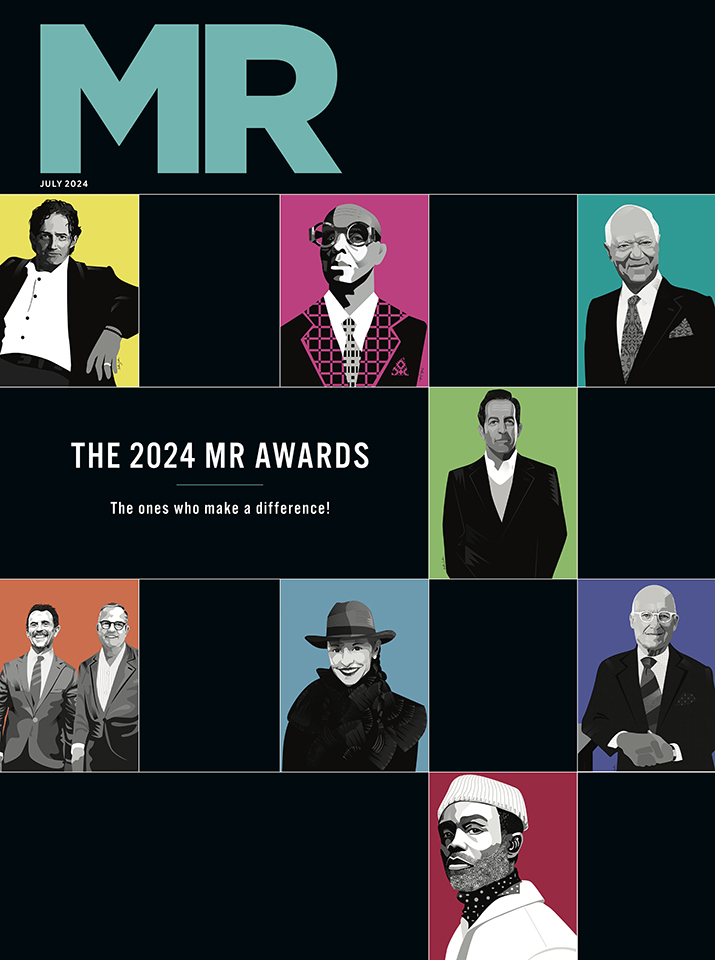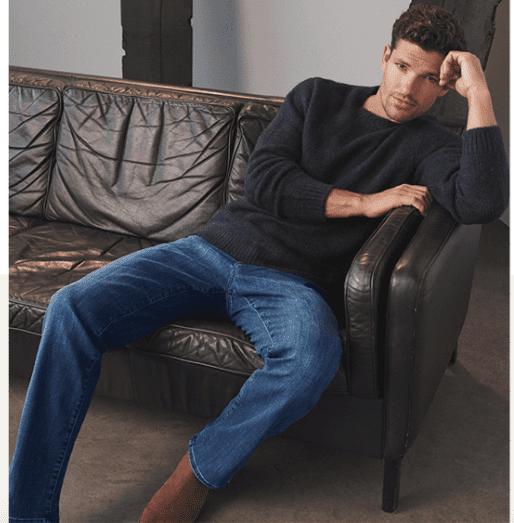DENIM WEEK: DRIVING SALES WITH SUSTAINABILITY AND DIVERSIFIED SOURCING

The push for greater sustainability in the fashion industry has strong proponents in the denim world, but even so, retailers are unsure how great an impact it has on sales. Gary Flynn at M Dumas suggests that although it’s a nice selling point, it’s not a mandatory prerequisite for his customers. Alan Gibeley counters that even if the customer isn’t looking for sustainable product, “it gives the salesperson another handle. It’s a selling tool that adds perceived value so customers are willing to pay more for it. We’re now seeing more and more of our European vendors promoting the sustainable aspects of their product.”
“We need to be committed to sustainable denim because it’s the right thing to do for our planet,” implores Flynn. “Let’s all stay the course on this, even if the consumer isn’t flat-out asking for it.”
Recognizing that a younger consumer — the primary market for most denim products — is more aware of practices that impact the environment and more likely to demand transparency from their brands, denim manufacturers are taking the lead in sustainable production.
Mavi, parent company of 34 Heritage (pictured above), continues to expand its All Blue collection, with a mission to make sustainable denim the norm. Says Arkun Durmaz, “We’re introducing more styles that feature organic, recycled, and renewable fabrics and fibers, which are made using clean and resource-efficient production processes. This results in denim that’s unmatched in fit, feel, style and comfort.” Watch for the brand’s introduction of a program to upcycle end-of-life, discarded denim. “Globally, we’re working toward providing consumers with greater visibility into our supply chain, environmental impact, and sustainability goals,” he maintains with pride.
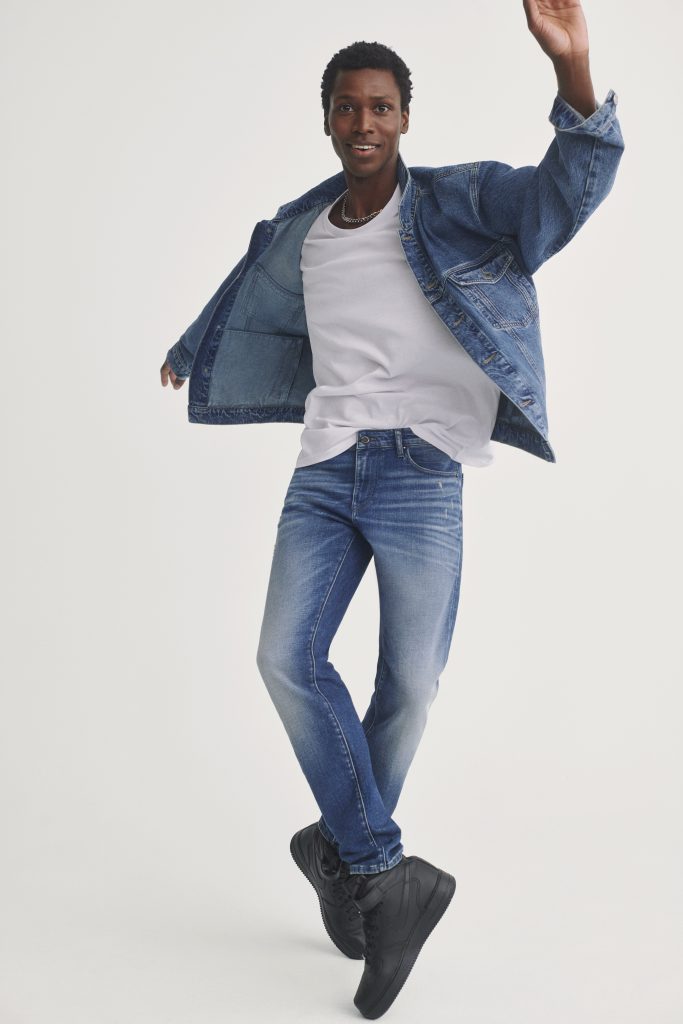
Sean Connelly, VP of Mens Merchandising & Sales at Devil-Dog Dungarees, is also proud of the progress his company has made. “Transparency and sustainability are achieved by our wholly owned Worldwide Responsible Accredited Production (WRAP) Platinum-certified factories.” (The brand, which launched in 2019 and recently increased its offerings to include jackets, tops, and accessories, also supports injured veterans through its association with the Wounded Warrior Project, another important move for social consciousness.)
“We need to be committed to sustainable denim because it’s the right thing to do for our planet,” Gary Flynn, M. Dumas
Last year, Wrangler launched its WeCare Wrangler sustainability platform, uniting the brand’s legacy of sustainability with measurable goals designed to reduce environmental impact. “To drive progress toward our sustainability goals,” says Jenni Broyles. “We’ve launched several sustainable product lines including the Retro Green Jean assortment, which improved on favorite Wrangler styles with a variety of natural fibers, recycled hardware and eco-friendly materials. We also launched the Wrangler Rooted Collection, a limited, premium line made from 100 percent sustainable, local cotton. In September, we launched our most sustainable denim yet, Infinna, which is made with regenerated, recyclable fibers and Indigood, foam-dye technology that lowers wastewater by over 99 percent, reducing our overall environmental impact.”
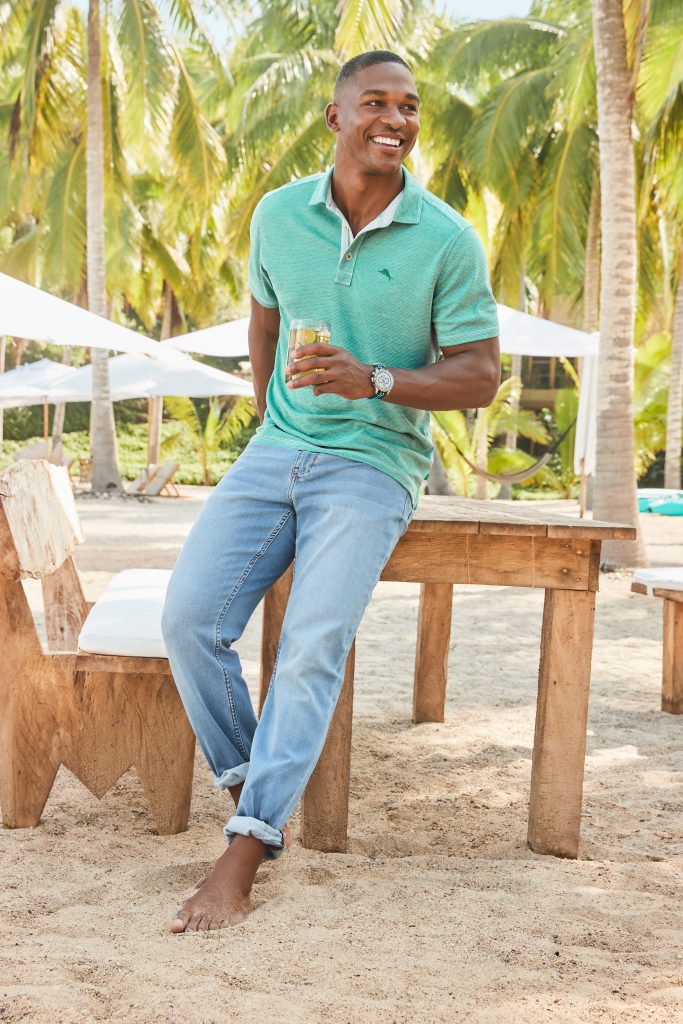
As Tommy Bahama’s Dawn Brandl, puts it, “We’re committed to sustainability to ensure that we and our guests can continue living ‘the island life’ for generations to come. We’re taking steps to ensure our products are made responsibly, with care for the workers who make them as well as with a smaller environmental footprint.” The blend of its Boracay jean includes sustainable fibers and, by Fall 2022, all wash processes and finishing will be eco-friendly.
Chip Bergh at Levi’s reiterates the company’s major focus. “First, we’re centering our ESG [Environmental, Social and Governance] efforts on three main pillars: climate, consumption, and community. Second, a key objective of our report is to hold ourselves publicly accountable and to challenge ourselves to be even more ambitious in our efforts. We plan an annual reporting cadence going forward.”
Productive Partnerships
While a great marketing campaign goes a long way in the denim market, collaborations are still the name of the game. “We’ve seen great success collaborating with brands that offer a deeper connection to our consumers,” says Wrangler’s Broyles. “Collaborations allow us to tap into new customer bases, retail partners and categories while staying true to the essence of our brands. Last year, we launched a number of successful collaborations, including those with Adult Swim’s Rick and Morty, Billabong, Yellowstone, and Pottery Barn Teen. By partnering with these brands, we delivered an authentic Western vibe to our loyal fans, while introducing the spirit of the West to a new generation of brand enthusiasts.”
The brand’s campaign from Fall 2021 offered a refreshing, more diverse look at denim styling than many of us might associate with a Western heritage brand. “For the Ride of Life,” was styled by Heidi Bivens (costume designer for hit-HBO show Euphoria) and anchored by a film narrated by rising country music star Orville Peck. It featured a diverse array of real people following their passions, from a rap crew to a roller girl gang, an eSports player, skateboarder and cowgirl to young families and an older couple starting a new life together.
Supply Chain Solutions
Surprisingly, as much as supply chain issues were affecting nearly every market, adding to the inflation balloon that all are experiencing, it had less impact on the denim market than on others. Retailers consistently complimented brands’ in-stock programs with keeping goods flowing. On the manufacturing side, there were of course a few hiccups.
“Luckily, since we produce all our denim jeans in this [Western] hemisphere, in our own factories, we’re not experiencing the extreme logistical shipping and port challenges as our competition,” says Devil Dog Dungarees’ Connelly. “However, supply chain issues are global and have affected the time and action required to purchase raw materials. We have to make decisions earlier and are encouraging our customers to do the same.”
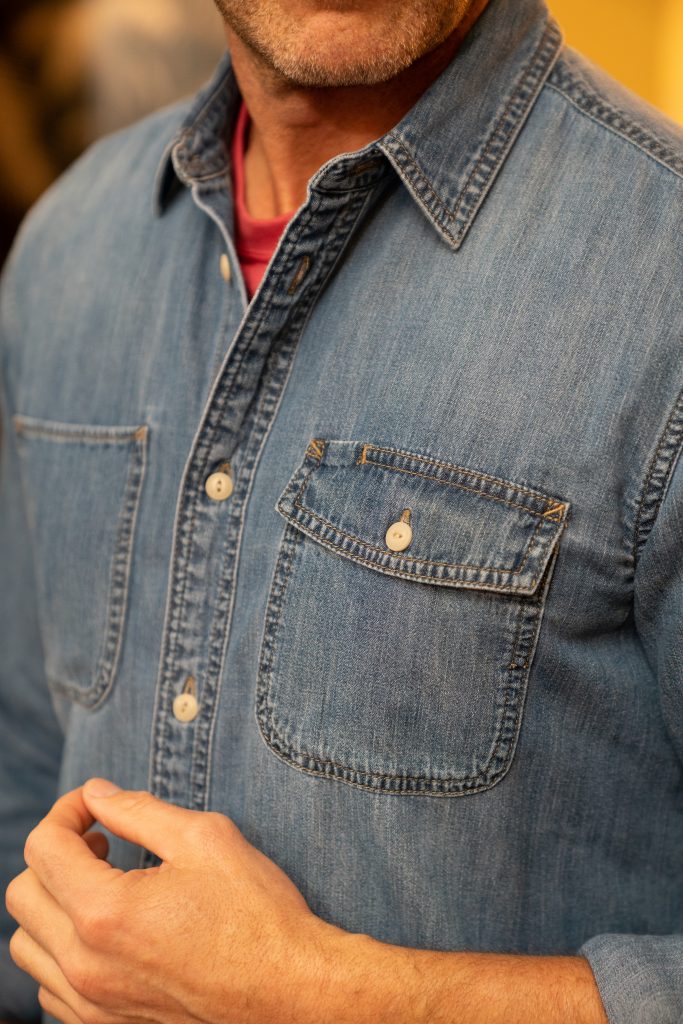
“While we experienced some challenges in shipping cargo, on the supply chain side of things we are luckier than most thanks in large part to the close relationships we have with our suppliers,” says Arkun Durmaz at Mavi. “We’ve been in partnership with some of our mills for 30 years or more, and these relationships only get stronger and more reliable during times like these.”
At Levi’s, Chip Bergh points to a long-standing policy of sourcing diversification. “We long ago decided that we would not source more than 20 percent of our product from any one country. Our sourcing currently spans 24 countries…more than 50 percent of our current bottoms volume is approved for production with suppliers in at least two different source countries, sometimes more for men’s core.” The denim behemoth was therefore able to shift imports from backed-up West Coast ports to the East Coast , allowing Levi’s a way out of the shipping slowdowns.
